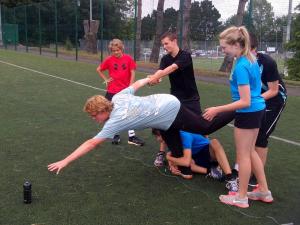Do your athletes thrive or survive?
Every get the feeling you are muddling through?
 That is what a lot of parents of young athletes feel like. Buffetted along the river of teenage years, carried by a current of car journeys,camps. training sessions, angry coaches, exams and hormones.
That is what a lot of parents of young athletes feel like. Buffetted along the river of teenage years, carried by a current of car journeys,camps. training sessions, angry coaches, exams and hormones.
The 5th Athlete Support Day was designed to put some sense into this madness and give the parents and young athletes a rudder to help them steer their way through (enough of the boating analogy).
11 questions every athlete needs to ask themselves
This was our starting point. I got the athletes in pairs to discuss where they were and give themselves a mark out of 5 on each point. These questions highlight the key areas that differentiate those who participate from those who are trying to perform.
Part of the remit of the Excelsior Athletic Development Centre is to make the athletes self-aware. We have previously got them assessing their own physical capability, this session was designed to get them thinking about their training habits.
There is a nexus at 15-16 where parents have less of a role and the developing athlete is trying to form habits that last into senior years. Those habits are crucial in developing potential once maturation has evened out. (Earlier success is often due to early maturation or heavy parental input, hence one reason why “early specialisation” fails).
Beginning strength training
The next part of the day was building on strength training exercises developed previously. It is amazing to see that new people who have been part of “academies” for at least a year are unable to control their own body weight.
I am flabbergasted at why anyone would suggest athletes should lift weights before they can do a single press up correctly.
Rather than handing out the ubiquitous sheet of paper with exercises on it, I get the athletes to think of 2-3 variations of the movements: squat, push, pull, rotate, brace. Then they practice those and write them down. That then becomes their programme. For some that means body weight, some it is Dumbbells, some it is barbells.
Application
 The last two sections of the day were getting the athletes running fast and exploring different ways of moving. Using principles I have learnt from Frans Bosch and Gary Winckler I concentrate on 2 key points in any session at the most and then find 2-3 ways of developing that.
The last two sections of the day were getting the athletes running fast and exploring different ways of moving. Using principles I have learnt from Frans Bosch and Gary Winckler I concentrate on 2 key points in any session at the most and then find 2-3 ways of developing that.
The youngsters seemed to embrace the challenge, and then I have to turn it down a bit as the co-ordination fails to keep up! This is the tricky part of coaching a group: each person has a different framework, mindset and needs. It is also the fun part!
Last up: stretch,curl, hop, roll, slide and soar. These key words describe what I want the athlete to do, they find ways of doing that. Very young children are expressive and have few inhibitions. This group were typical of the mid teenage years and were afraid of “getting it wrong” or “looking stupid“.
That soon changed and they broke free of the societal shackles and became very innovative. I then set up a few puzzles and tasks that they could only solve using these movements: either individually or as a group.
Do you want to become a better athlete?
So far this year, 5 of the athletes from the Athletic Development Centre have gained their first International Caps: 3 in Hockey, 1 in Modern Pentathlon and 1 in Track and Field.
That is really nice, but more importantly the other regular attendees are developing their athleticism and improving their performance: Injury Free! if you are a teenage sports player and want to learn how to train or a sports coach who wants your players receiving expert advice, then please contact me here
There is no promise of International selection, no fads, no quick fixes, no “guru” talk: just sound coaching in a supportive environment.
Thanks to Exeter University for hosting the day.

Some truly good blog posts on this site, thank you for contribution.